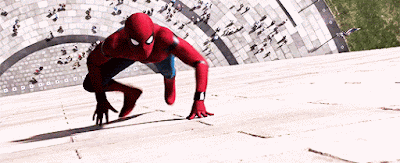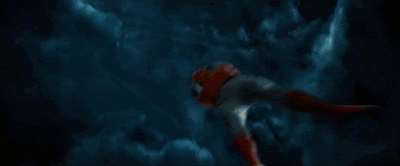Lead Them to Paradise
or
You Can't Have a Messiah Without a Mess at the Beginning.
"God created Arrakis to train the faithful"
from "The Wisdom of Muad'Dib" by the Princess Irulan
When last we left Paul Atreides (Timothée Chalamet), he and his Mother Jessica (Rebecca Ferguson) were the last survivors of an attack on their new home on Arrakis by the House Harkonnen, in order to win back the all-important spice-mining business, around which the very Universe itself depends.
The first film ended with Paul's pivotal killing of the Fremen Jamis—his first real doubter of the Arrakis indigenous tribe—in order to become part of their number and learn their ways, and Dune: Part 2 begins almost immediately after that act.
It is clear—even without a viewing of his continuation—that writer-director Denis Villeneuve dearly loves Frank Herbert's story, and, as a result, it's more faithful than the previous versions (the story is so dense, with plots, sub-plots, and arcana that is was dubbed "unfilmable"), certainly in regards to the ways of Arrakis' inhabitants, the Fremen and their relationships with water and the predatory sand-worms—the "Shai-Hulud"—while also delving a bit more into the ways of the manipulative Bene Gesserit sisterhood, of which Jessica is a part.*So, along with the blistering action sequences, the vast desert vistas, and the Leni Riefenstahl-styled troop formations, we get a bit more of the sociology of the Fremen, their belief systems, their legends...and that, though they may be monolithic, they are not as homogeneous in their ways as in prior depictions. These Fremen actually have personalities, as opposed to the stoic stalwarts they've been portrayed as before.
That's good. And it gives them a chance to shine (seeing as how they dominate this second act), and provide rich characters for Javier Bardem and Zendaya to play around with, rather than as merely devoted followers to be led. Bardem's Stilgar is shown to be a bit of a romantic zealot, but with enough years to still be suspicious of the legends coming true, while Zendaya's Chani distrusts the prophecies, knowing full well that giving in to a messianic leader is just another form of slavery.
Those are good concepts, part of a couple of the dualities that Dune: Part 2 leans in on—dualities which Herbert chose not to spell out, but merely allowed to percolate as sub-text. And it shows that Villeneuve is confident enough in his work that he complicates it even more than the original author did.
So, there was quite a death-toll among the A-listers in the first Dune, so, right off the studio logos, we start being introduced to the new cast-members, starting with Florence Pugh as Princess Irulan, daughter of the Emperor Shaddam IV (Christopher Walken, and it's nice that composer Han Zimmer didn't give him any background music with cow-bells), as the Princess notices the Emperor's ruminating silence over the death of Duke Leto Atreides in the previous film; she is the chronicler of the tale, and it's a good thing because there's quite a lot of catching up to do.
We also get to meet Feyd-Rautha (Austin Butler, proving he's not a one-trick-pony depending on his looks) the Baron Harkonnen's younger, more psychotic son, who is Paul's final test, and, as well, a character no one's bothered with before, Lady Margot Fenring (Léa Seydoux) who's deep in the depth's of the Bene Gesserit conspiracy.
"I'd wish you the (best of luck), but it seems you've won your battle."
Then, there's one character, who's always problematic—Paul's sister Alia (yeah, I'm not going to tell you), the last child of Duke Leto Atreides. Villeneuve eliminates the two year gap that Herbert inserted into the book, so we don't get to see a walking talking two year old, instead we see the child in Jessica's womb, talking to both mother and brother through her thoughts. Okay, weird, but not as weird as it could have been.
A lot of set up here, much like you could say Dune was merely the set-up for Part 2 (which is accurate, but there was so much of worth in the first one that it wouldn't be a fair assessment). It is nearly three hours of non-stop posturing, gritty action and a soundtrack you can feel in your ribs, with all sides circling around each other for a big pay-off that is, justifiably, a little melancholic. Think of The Godfather meeting "Game of Thrones". It certainly does the book justice, and although "Dune" devotees may quibble with a couple of changes—no two year gap, so no Alia and no Guild and the changes to Chani (which I'll get to in a second)--one can't deny that this is as close to movie-form as we're going to get. It's amazing. It's fantastic. It's a must-see. Simple as that for being as complex as that.
And I want to see where they go with the next one ("Next one?" Yeah...author Herbert wrote a few books!). They've done a very logical, character-driven change to the character of Chani...to the betterment, I'd say, as I've always had an uneasiness about her character, previously. It will add a complication, and a personal element to the road ahead (if they follow Herbert's road-map) and if Villeneuve is willing to already muddy the...er.. sand and stir things a bit, I'm all for it.
It's one of those movies that I can recommend without hesitation, and those are few and far between. And I'd love to be able to eavesdrop some of the post-viewing discussions.
For me, being a fan of the book (and a couple of the others), it's nice to be able to look at these two films back-to-back and say that we finally have a "Dune" adaptation, we don't have to make excuses for.
He was warrior and mystic, ogre and saint, the fox and the innocent,
chivalrous, ruthless, less than a god, more than a man was. There is no
measuring Muad'Dib's motives by ordinary standards. In the moment of his
triumph, he saw the death prepared for him, yet he accepted the treachery.
Can you say he did this out of a sense of justice? Whose justice, then?
Remember, we speak now of the Muad'Dib who ordered battle drums made from
his enemies' skins, the Muad'Dib who denied the conventions of his ducal
past with a wave of the hand, saying merely: "I am the Kwisatz Haderach.
That is reason enough."
--from "Arrakis Awakening" by the Princess Irulan
* In fact, the only thing Villeneuve ignores is the Spice Guild, particularly its Navigators, spice-mutated humans who have attained the power to "bend space" and thus travel between worlds, a necessary component in a story about commerce, and the resources needed to maintain them for power.
























































